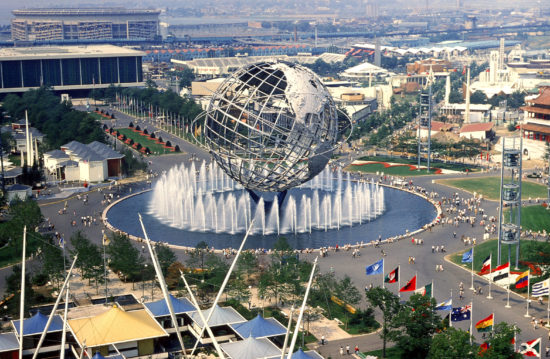By Katherine Brown, Ph.D., President & CEO, Global Ties U.S.

1964 New York World’s Fair | Antoni Conti, PLCjr / CC BY-SA 2.0
Global Ties U.S. is very proud to present “Experiencing Expos: An Oral History of U.S. Citizen Engagement in World’s Fairs, 1962-2017,” which was done in collaboration with Anna Kaplan, Ph.D., and Maggie Lemere, with support from Alexis Zilen and sponsorship by the National Endowment for the Humanities (NEH).
In late 2020, Global Ties U.S. started talks with the National Endowment for the Humanities about how we could research the impact of International Expositions (also known as World’s Fairs). We were already working to increase the scale of citizen diplomacy representation at the USA Pavilion at Expo 2020 Dubai and we were curious to learn more about the impact participation in previous Expos had on U.S. citizens. We agreed that an oral history project would be both a time-efficient and meaningful way to discover the lived experiences of our fellow citizens who participated in Expos inside the United States, from 1962-1984, and those who represented us at ones abroad, from 2010-2017.
In addition to Anna, Maggie, and Alexis, we partnered with three of our member organizations—Global New Orleans, San Antonio International Visitors Council, and World Affairs Council of Seattle—whose cities hosted Expos in the second half of the 20th century to identify narrators for this project. For those who experienced Expos abroad, we focused on the Youth Ambassadors who served at USA Pavilions in Milan, Yeosu, Shanghai, and Astana to guide us through their experiences.
Among all 46 narrators who engaged with Expos within the United States and abroad, there was almost unanimous consensus that these events matter—and that they matter even more for international cooperation and collaboration at home going forward. Expos can help identify how different countries and communities are attempting to address difficult issues and may lead to brainstorming and network building to address universal issues, such as climate change, at both the local and global levels.
For narrators who experienced Expos inside the United States in the second half of the 20th century, the impact was deep and powerful. They expressed a common sentiment that it was “as if the world came to them when they could not travel the world,” and attributed career changes or the lifelong encouragement to be curious and seek education to their experiences at Expos. The events created a shared experience and community for them. Most felt that exposure to different things at Expos made the rest of the world feel less foreign, cultural differences less scary, and more confident in exploring and experiencing new cultures. The Expos also provided a fundamental opportunity for the host cities to introduce and/or reinvent themselves, both nationally and internationally. Residents felt a sense of collective accomplishment and pride as the Expos forever changed their cities’ landscapes, leaving enduring landmarks still famous today, like the Space Needle in Seattle.
The narrators who experienced Expos while representing the United States as Youth Ambassadors were deeply curious individuals committed to traveling and working abroad. Each former Youth Ambassador interviewed believed that their experience was a key moment within a trajectory that allowed them to gain a new level of self-awareness, cross-cultural fluency, and helped catalyze and cement a more self-aware idea of what being an “American” is. Through Youth Ambassadors’ physical presence and role at USA Pavilions at Expos, the United States has a special opportunity to embody and express core national values through our citizens, representing a variety of racial, cultural, linguistic, socio-economic, and religious backgrounds.
These oral history conversations provide us with many opportunities for reflection. A defining characteristic of each conversation was that the narrators valued these experiences and care deeply about the United States’ future involvement in Expos via both hosting again and building future USA Pavilions, like the upcoming one for Expo 2025 Osaka. They want U.S. representation to be more inclusive and allow for more meaningful conversations and community integration, and for the structures to emphasize sustainability. The USA Pavilions have a unique opportunity to reach audiences who may never travel to the United States and provide them with a new view of the diversity of U.S. society, our national story, and our potential for the future. The narrators also stressed the importance of U.S. Government support and federal investment to ensure this inclusivity, accessibility, and sustainability for the U.S. communities that host them, and for the USA Pavilions at Expos abroad. Meeting the potential of these events means long-term, steady investments.
In sum, there was consensus that U.S. participation in Expos should be more robust, but also reimagined to offer something unique and to capitalize on the country’s greatest soft power assets: its values, its innovations, and its people.
We hope you will take a few minutes to read about this oral history – and to delve deeper into the other resources about these critical public diplomacy platforms offered at the end of the paper. We also encourage you to visit one of the 19 virtual and in-person community conversations happening across the country in May and June 2022 with the Global Ties Network to talk about how to revitalize U.S. participation in these mega-global events as international cooperation and network-building become increasingly essential. Global Ties U.S. believes that the foundation for national security and economic prosperity is built from relationships. Expos, and the story we choose to tell at them help strengthen that foundation for the United States, while building cultural competence and opportunity for U.S. citizens.
